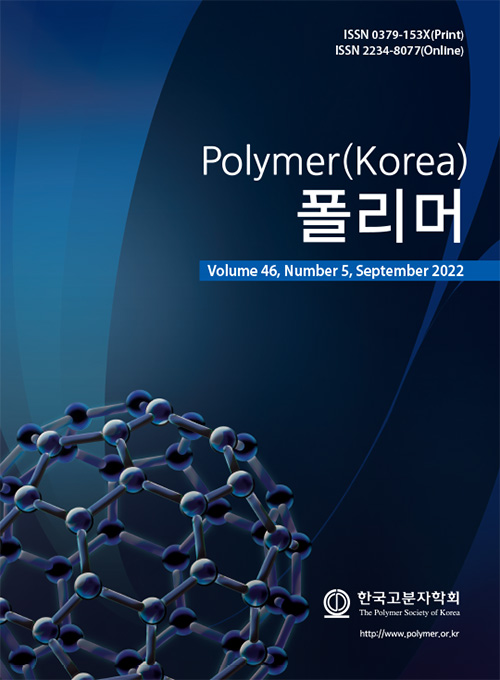- Study on the Strain Sensor by Using Iron(III) Sulfonate Complex/Thermoplastic Polyurethane Composite
Division of Advanced Materials Engineering, Kongju National University, 1223-24 Cheonandaero, Cheonan, Chungnam 31080, Korea
- 철(III) 술포네이트 착화합물/열가소성 폴리우레탄 복합체의 스트레인 센서 응용 연구
공주대학교 공과대학 신소재공학부
Reproduction, stored in a retrieval system, or transmitted in any form of any part of this publication is permitted only by written permission from the Polymer Society of Korea.
In this study, the strain sensor application based on thermoplastic polyurethane (TPU) and iron(III) p-toluenesulfonate (FTS) is investigated. In general, FTS has been utilized as an oxidant for the oxidative-coupling reaction of conductive monomers for the synthesis of conducting polymer. In this study, FTS is considered as an active component for strain sensor that exhibits changes in electrical resistance due to strain for the first time. The TPU-FTS composite based strain sensor can detect various types of strain from small strain (<5%) to large strain (10-200%) area and distortion motion with excellent sensitivity. When the content of FTS was increased, the elasticity of the composite decreased and the conductivity increased, showing a stable response signal according to the strain in the TPU-FTS composite having an appropriate FTS content (~43 wt%). This can be explained by the reorganization of repetitive conduction pathways without permanent structural destruction of the composite in the region of the optimum FTS content in the TPU-FTS composite. The simple fabrication of strain sensors based on non-traditional resistance sensing materials such as iron(III) sulfonate complexes is expected to have applications in various sensor fields.
본 연구에서는 열가소성 폴리우레탄(TPU)과 iron(III) p-toluenesulfonate(FTS) 복합체의 스트레인 센서 응용을 조사하였다. 일반적으로 FTS는 전도성 고분자의 중합을 위한 전도성 단량체의 산화-커플링 반응 산화제로 활용되어 왔다. 본 연구에서는 FTS를 스트레인에 의한 전기저항 변화를 발현하는 활성 성분으로 고려해 본 결과, TPU-FTS 복합체 기반 스트레인 센서는 작은 변형(<5%)에서 큰 변형 영역까지(10~200%) 우수한 민감도로 감지할 수 있었다. TPU-FTS 복합체에서 FTS 함량을 증가시키면 복합체의 신축성은 감소하나 전기전도도는 증가한다. 실험한 범위에서 43%의 FTS를 사용하였을 때, 변형율에 대한 응답신호가 안정적이었다. 이 영역에서 영구적인 구조 파괴없이 전도 경로가 재구성되었기 때문이라고 생각된다. 철(III) 술포네이트 착화합물과 같은 비전통적인 전기저항 감지 재료를 기반으로 하는 스트레인 센서의 간단한 제작은 다양한 센서 분야의 응용 가능하리라 예상한다.
Keywords: strain sensor, iron(III) sulfonate complex, thermoplastic polyurethane, elastomer composite, conductive polymer.
- Polymer(Korea) 폴리머
- Frequency : Bimonthly(odd)
ISSN 0379-153X(Print)
ISSN 2234-8077(Online)
Abbr. Polym. Korea - 2022 Impact Factor : 0.4
- Indexed in SCIE
 This Article
This Article
-
2022; 46(5): 646-653
Published online Sep 25, 2022
- 10.7317/pk.2022.46.5.646
- Received on May 16, 2022
- Revised on Jun 22, 2022
- Accepted on Jun 22, 2022
 Correspondence to
Correspondence to
- Jin-Heong Yim
-
Division of Advanced Materials Engineering, Kongju National University, 1223-24 Cheonandaero, Cheonan, Chungnam 31080, Korea
- E-mail: jhyim@kongju.ac.kr










 Copyright(c) The Polymer Society of Korea. All right reserved.
Copyright(c) The Polymer Society of Korea. All right reserved.